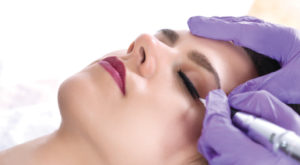 In Part I we discussed the definition and essentials of PMU, its historical development, the advantages and aspects to be considered before planning any PMU procedure. In Part II we continue to answer these important questions to help you to make an informed decision about the procedure that you wish to get done. However, you can (and should) ask your permanent makeup artist any other questions that you might have. Now let the questions begin!
In Part I we discussed the definition and essentials of PMU, its historical development, the advantages and aspects to be considered before planning any PMU procedure. In Part II we continue to answer these important questions to help you to make an informed decision about the procedure that you wish to get done. However, you can (and should) ask your permanent makeup artist any other questions that you might have. Now let the questions begin!
1. What are the reasons to have PMU done?
Convenience: Some people want to save time and money by not having to do their makeup every day, yet retain the benefits of enhanced facial features.
Difficulties to properly apply makeup due things like vision problems, arthritis, shaky hands, etc.
Hair/color loss due to alopecia, chemotherapy, accidents, burns, surgeries, etc.
Allergies and sensitivities to normal makeup.
2. Is PMU forever?
It should NOT be. Lets clarify something: the “permanent” in “permanent makeup” doesn’t refer to the durability of the results; it refers to the fact that once it is implanted to the skin, it can’t be wiped off like normal makeup (to be PMU “free”, it is necessary either wait months/years for the pigment to lose molecular density and fade, or to start a removal process).
PMU pigments nowadays are designed to lose molecular density faster. Why? Because our facial features are constantly changing and what suits them now, might not in 5, 10, 15 years. And that’s why having more “forgiving” pigments that allow some range of shape/color adjustment during the “touchups” or color refreshment sessions that will be needed as time goes by, seems to be a great idea. Now when PMU is done too deep on the skin and/or with the wrong pigments, it will take longer for it to fade (sometimes it barely does) and the color will age poorly. This said; please remember that even when faded, some amount of pigment will always remain in the skin.
Bottom line, Permanent Makeup is done with long lasting (compared to normal makeup) results in mind, but a well performed PMU procedure should start showing color fading in a matter of months (Manual techniques) or after a few years (Machine techniques).
3. So how long a PMU treatment really last?
This is a matter that depends of several factors but as a general idea, manual procedures can last between 6- 18 months and machine procedures between 2-6 years, before a color refreshment is needed. Keep in mind that the darker the color, the longer it lasts. This is why permanent eyeliner is the longest lasting procedure, and also why pure black pigments should not be used for eyebrows (with a few very special exceptions).
4. What are those factors in how long Permanent Makeup really lasts?
Technique: Manual techniques (microblading, soft tapping etc.) last shorter than machine techniques. This is not because the pigment is delivered to a deeper layer when using a machine as most people believe (all cosmetic tattooing should deliver pigment on the basal membrane of the dermal layer of the skin), but because the machine has the possibility of delivering larger amounts of pigment to the skin. The needles of a machine can penetrate the skin between 50 and 3000 times per minute, and that’s something that can’t be achieved when working manually.
Skin type: Oil on the skin is one of the more effective agents for breaking down the pigment molecules. This means that oily skin type will have faster pigment metabolism, hence the color will fade faster.
Lifestyle: Another powerful agent for breaking down pigment molecules is the salt in sweat, so spending a lot of time outdoors, exercising, or in saunas will prompt more frequent color refreshments.
Health conditions: some health issues and medications affect the durability of the pigment in the skin.
There are still several important matters to be considered before getting PMU, but time and writing space disappear when you are having fun. In our next article we will go over some of these questions:
What kind of technique is better when getting PMU treatments, manual or machine?
What are contraindications for PMU?
Why should I have a prior consultation?
Is it painful?
How long is the treatment time and what’s done during it?
What results can I expect?
How long will the results last?
What aftercare do I need to follow?
What kind of at-home maintenance should I follow?
What should I do if I am unhappy with my results?
For additional information visit our FB or IG “MiBella DermaStudio” pages, or feel free to contact me at: bella.brunk@mibelladermastudio.com
mi bella derma studio
335 Doris Drive
Lakeland, FL 33813
863-738-9328
Check Also
Skin Changes in The Lower Leg are a Sign of Venous Disease
Skin changes – discoloration (pinkish or brownish), thickening, dryness and itching in the lower leg …
 Central Florida Health and Wellness Magazine Health and Wellness Articles of the Villages
Central Florida Health and Wellness Magazine Health and Wellness Articles of the Villages



